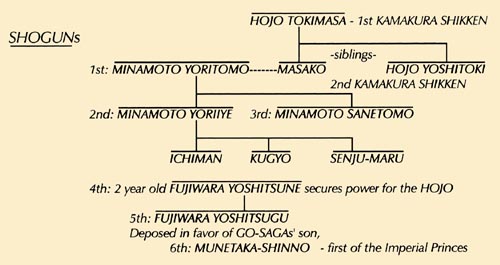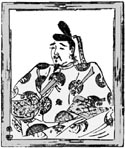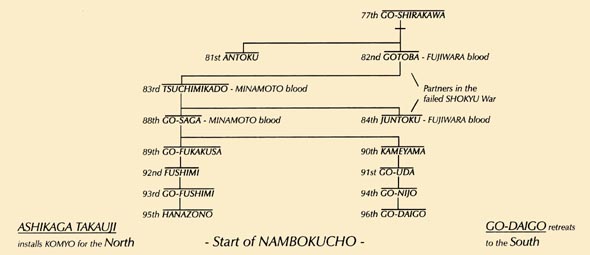YAMASHIRO - GOTOBA and GEN-RYAKU KYOTO

| ©
Copyright Robert Cole 2014 - No
copying or distributing -Note: Missing
graphics YAMASHIRO - GOTOBA and GEN-RYAKU KYOTO |
 |
| This is the story of a struggle against the political greed of competing interests. Family blood wrestled the throne in a five way match for the future. Until this time the strategy for power, as modeled by the FUJIWARA, was the production of heirs with Imperial blood. TAIRA KIYOMORI challenged this system by staking TAIRA women to the game. The MINAMOTO replaced the TAIRA, but MASAKO played them all like garden carp. More MASAKO |
The Imperial players:
| GOTOBA | TAKAHIRA-SHINNO,
4th son of TAKAKURA-TENNO
Mother: SHICHIJO-no-IN - FUJIWARA-no-SHOKUSHI |
The pinned garments of a TAIRA wife held the YATA-no-KAGAMI The Sacred Mirror from loss but the dark waters of DAN-no-URA drank forever the MURAKUMO-no-TSURUGI and its little Emperor, ANTOKU. - See MURAKUMO Sword in YAMATO and TOKIWA GOZEN in RYUMON At twelve, GOTOBA, ANTOKU's little brother, made MINAMOTO YORITOMO, "SEI-I-TAI-SHOGUN" |
| TSUCHIMIKADO | GOTOBA's
eldest son Mother: JOMEIMON-IN - MINAMOTO-no-ARIKO |
| Ascended the throne at 3 years in 1199. Until the TAIRA were vanquished, Imperial blood knew FUJIWARA women. It is said GOTOBA preferred TSUCHIMIKADO's brother, FUJIWARA blood, JUNTOKU. A man of good character, MINAMOTO son, TSUCHIMIKADO, reigned 12 years and abdicated in JUNTOKU's favor letting GOTOBA and pater's joy join company. He knew, regardless of all other considerations, GOTOBA could never retrieve rule as long as SAMURAI blood (with its accompanying relations) sat on the throne. |
| JUNTOKU | MORINARI-SHINNO
- 6th son of GOTOBA Mother: SHUMEIMON-IN - FUJIWARA-no-SHIGEKO |
| CHUKYO | KANENARI-SHINNO
became the "Emperor of 70 Days"
3 year old son of JUNTOKU |
 |
| When
MINAMOTO SANETOMO was assassinated in SHO-KYU
1219 by his jealous young nephew, KUGYO, son of the repugnant and
mutually ostracized 2nd
SHOGUN, YORIIYE, the bright yet brief,
MINAMOTO star blanked out.
His ruthless mother, the AMA SHOGUN, MASAKO and her younger brother, HOJO YOSHITOKI stepped over the throne with a 2 year old puppet SHOGUN, FUJIWARA YOSHITSUNE. YOSHITSUNE, a son of new MINAMOTO blood, was eagerly provided by FUJIWARA MICHIIYE (whose wife was the granddaughter of YORITOMOs' sister). The new SHOGUN was actually installed at 8 years in 1226. He will pass this mantle to his son in 1244.
CHU-IN - TSUCHIMIKADO SHIN-IN - JUNTOKU MASAKO, and brother, had carefully remained free to orchestrate both SHOGUNATE and throne from the comfortable insulation of KAMAKURA with its guise of treasonless power. Legally, their forces could be employed without the tangled potential that ropes a SHOGUN to his Emperor. |
 Gotoba-sama |
The HOJO's game was to arrange the
perfect balance between established
military governance and manipulated
Imperial ties. It required constant
cultivation by talented leaders - the
eventual flaw.
GOTOBA and JUNTOKU sought to throw the yoke of military rule and return forever, the Harmony of Divine Will. It was fate. Known with every month of the ICHIMONJI from 1208, it was the impetus to formulate the mass-production techniques developed by his Twenty-four GOBAN KAJI - to supply and arm Imperial forces with the magical gifts of the Gods, the Sword of the ICHIMONJI. |
| Imperial
Restoration had
been an imperative ever since YORITOMO's new institutions left the
offices of GO-SHIRAKAWA impotent. Now, with the
MINAMOTO gone and the HOJO propping a 2
year old - now must be the time.
For his part, the KAMI had warned clear-minded TSUCHIMIKADO that fate would be impropitious, and ungiving. Studious wisdom teaches Heavenly power can be harmoniously exercised only when the people are in jeopardy. As government is in the earthly realm, Imperial force must only be used to free the social body from destructive harm or tyranny. Otherwise, Heaven becomes supplicated to the low. The HOJO were not posing destructive jeopardy to the people and therefore, reasonably, Imperial restoration would fail. This too was fate, TEN-no-MEI "The Will of Heaven." - So TSUCHIMIKADO withdrew from preparations, willing to suffer with them, their inevitable exile. Needing a war is one thing. However, one has to start a war. - So one needs an excuse... It seems our Divinity wished to give the estates of KURAHASHI-no-SHO and NAGAI to two dancing girls, an extravagance the conservative YOSHITOKI refused. Enough was enough! GOTOBA announced his call against the HOJO. HOJO YOSHITOKI and MASAKO counseled and sent HOJO sons, YASUTOKI and TOMOTOKI, with brother HOJO TOKIFUSA against KYOTO. Three lost battles left the Imperial army successfully routed.
|
| The
HOJO
elevated 10 year old, GO-HORIKAWA to replace CHUKYO.
After a reign of 11 years, he abdicated for his 2 year old son and MICHIIYE grandson, SHIJO. When 12 year old, SHIJO-TENNO died in 1242, MICHIIYE then stepped in with another grandson, TADANARI, JUNTOKUs' son, vying a FUJIWARA as he had with his own son to the SHOGUNATE following the 1219 death of MINAMOTO SANETOMO. But HOJO YASUTOKI checked him, citing JUNTOKU's part in the SHOKYU War, and elected TSUCHIMIKADO's MINAMOTO son, GO-SAGA. This seemingly subtle card play was a major crossroads in history as it pushed MICHIIYE into the background and at the same time retained, and insured, the HOJO/KAMAKURA power umbrella for the next hundred years.
With one son holding the inheritable SHOGUNATE, the last will of Emperor GO-SAGA in 1272 decreed the prideful blunder of a shared inheritance which divvied the throne between the descendants of his two eligible sons, GO-FUKAKUSA and KAMEYAMA. HOJO SADATOKI enforced this mistake which shackled the future with too many options for too many hands and left open the ripe ticket for ASHIKAGA TAKAUJI's power grab that split the Imperial house some 60 years hence. |
 |
|